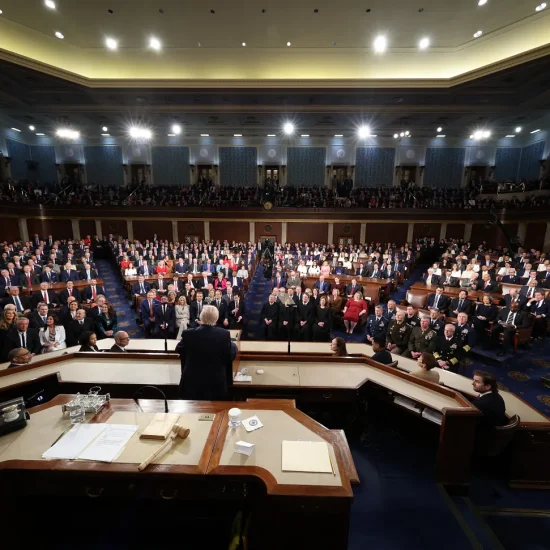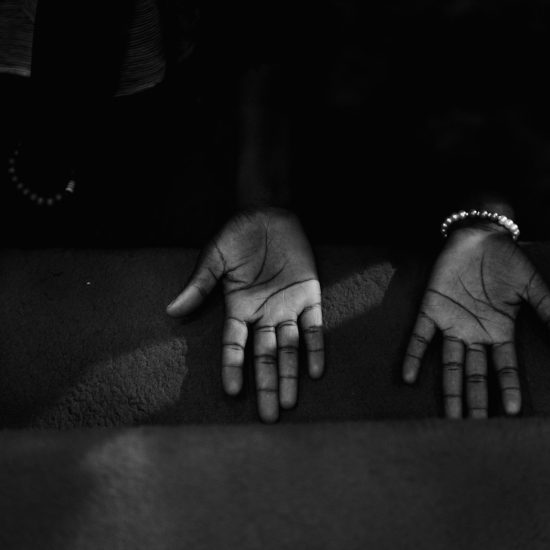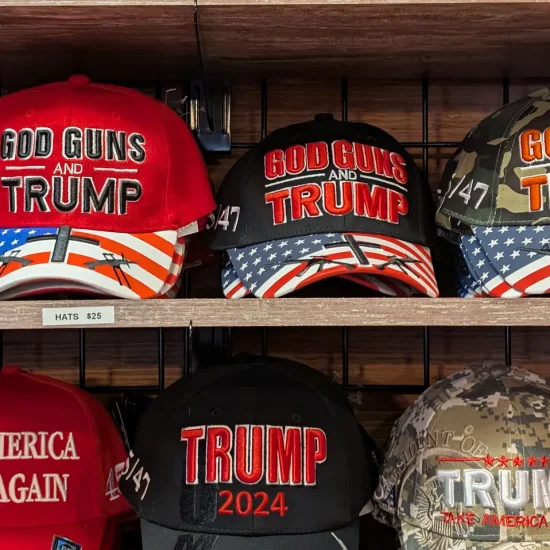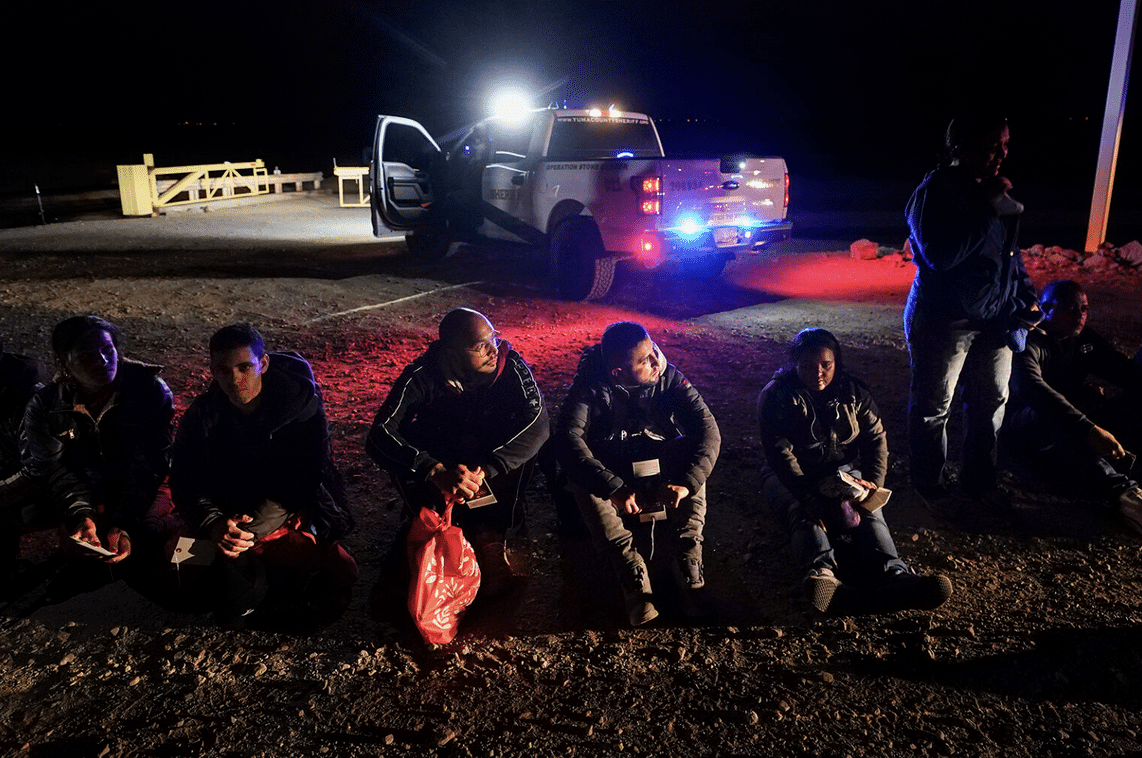
(RNS) — Faith leaders are reacting with concern to a report that President-elect Donald Trump plans to rescind a long-standing policy that discourages immigration officials from conducting raids at churches, schools and hospitals.
According to a report from NBC News on Wednesday (Dec. 11), the incoming Trump administration plans to do away with a policy outlined in an internal 2011 U.S. Immigrations and Customs Enforcement memo by then-ICE director John Morton. The policy discourages government agents from making arrests at or near “sensitive locations,” such as houses of worship.
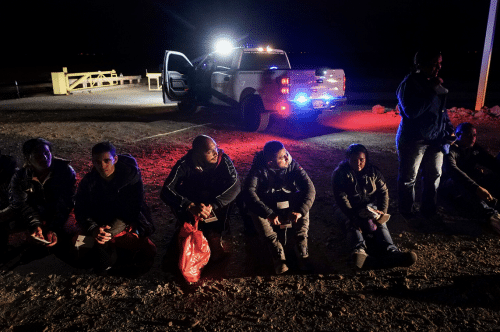
Migrants wait to be processed after crossing the border Friday, Jan. 6, 2023, near Yuma, Arizona. (AP Photo/Gregory Bull)
The news comes amid Trump’s campaign pledge to enact the “largest deportation” in U.S. history, which he has said could begin soon after he assumes office, and suggested in an interview over the weekend that U.S. citizens could be deported with undocumented family members.
The Trump transition team did not respond to a request to confirm the president-elect’s intent to change the policy, but the Rev. Gabriel Salguero, president of the National Latino Evangelical Coalition, said in a statement that news of the policy change was “sending a deep chill down the spine of the Latino evangelical church.”
In a separate interview, Salguero noted he recently completed a “know your rights” training with 82 Hispanic evangelical bishops, many of whom have immigrants — undocumented and otherwise — in their congregations. He called the proposed change “a fear-based policy” and voiced concern about whether it will respect religious liberty.
“How are they going to execute these raids? In ways that respect religious liberty and in ways that do not strike fear into children who are worshipping in Sunday school? I have 30 kids in a Sunday school class — I don’t know who is documented and undocumented,” Salguero said.
The Rev. Samuel Rodriguez, head of the National Hispanic Christian Leadership Conference and one of Trump’s evangelical advisers, maintained in an email that the policy change is more narrow in intent and that he is “convinced the incoming Trump administration will focus on criminal illegal immigrants.” He insisted the policy “serves as a warning” to undocumented immigrants who engage in criminal activity, such as “sex, human, and drug traffickers” or “rapist, gang members.”
“I do not foresee in any way, the administration targeting or going into schools or churches, pursuing God-fearing law abiding immigrants who have been here for 15 years or more, and whose children were born or raised here,” Rodriguez said.
But other faith leaders are not as sure, such as those who participate in the New Sanctuary Movement, a faith-based effort that began under President Barack Obama’s administration and expanded greatly during Trump’s first term. Participants in the movement, which includes members of many faiths, allow undocumented immigrants at risk of deportation to take up residence in houses of worship, hoping to pressure immigration officials into dropping their deportation orders. Some immigrants have lived in churches for years, until eventually leaving after deportation orders were rescinded or changed.
Umstead Park United Church of Christ in Raleigh was one of a half dozen North Carolina churches that sheltered undocumented immigrants during the first Trump administration. The Rev. Doug Long, former pastor of Umstead, now retired, suggested he wasn’t entirely surprised by the proposed change, which activists feared would occur during Trump’s first term.
“If they are making that announcement, I think it brings some clarity because we assumed it was already gonna happen,” Long said.
When former North Carolina-based sanctuary leaders met last month, he added, the activists concluded that churches wanting to help undocumented immigrants would need to pursue new avenues.
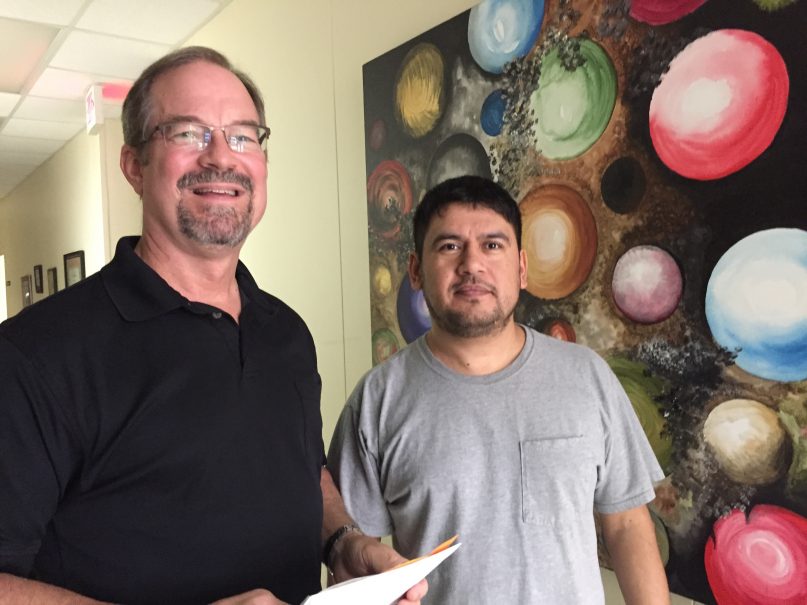
Doug Long, left, former pastor of Umstead Park United Church of Christ in Raleigh, N.C., in 2017, with Eliseo Jimenez, who took sanctuary at the church. (RNS photo by Yonat Shimron)
“It’s a very different situation than it was five, six years ago,” Long said.
Still, liberal-leaning church leaders said they did not expect to retreat from their commitment to protecting undocumented people, a position they said is grounded in the scriptural call to love the stranger.
“When Jesus told us to love our neighbors, he didn’t also tell us to make sure that they were documented,” said the Rev. Isaac Villegas, a Mennonite, whose church, the Chapel Hill Mennonite Fellowship, gave sanctuary to an undocumented immigrant during the first Trump administration. “He just said love and care for your neighbors. Full stop. Not, oh, check their documentation status while you’re at it.”
Longtime immigrant rights advocate the Rev. Noel Andersen, a United Church of Christ minister and national field director at Church World Service, a group that helps resettle refugees, expressed outrage over reports of the policy change.
“The right for all people to find safety, refuge and rest in houses of worship is fundamental to our nation’s history of religious freedom and our longstanding values,” he said in a statement. “No one should face fear of deportation when going to houses of worship, seeking medical care, social services, at public demonstrations or taking their kids to school. Regardless of what policy the Trump administration rescinds or puts forth, faith communities will continue to look to our sacred texts and centuries of tradition to live out our faith by welcoming immigrants and protecting the most vulnerable among us.”
Andersen added: “We must lead with compassion and love instead of cruelty or fear to keep families together and to ensure that all people are treated with their God given dignity.”
Other religious groups appear to be taking a wait-and-see approach to the news.
Chieko Noguchi, spokesperson for the U.S. Conference of Catholic Bishops, said in a statement the group of prelates is “aware of the various proposals being discussed with regards to immigration, and are preparing to deal with a range of policies, and will engage appropriately when public policies are put forth by the office holders.”
Representatives for the Evangelical Lutheran Church in America, a denomination that declared itself a “sanctuary church body” at its 2019 Churchwide Assembly and whose members taped “9.5 theses” expressing their concern for immigrants to the door of an ICE building in Milwaukee, declined to comment.
The New Sanctuary Movement is an extension of an earlier effort that occurred in the 1980s, when churches along the U.S.-Mexico border opened their doors to an uptick in migrants, especially those fleeing El Salvador and Guatemala, whom the government largely denied requests for asylum. The ICE memo did not exist at the time, and in 1986, the FBI infiltrated the movement and indicted 16 activists before ultimately convicting nine. The movement is credited with pressuring President Ronald Reagan’s administration to do more to help Guatemalans and Salvadorans.
Religious activists associated with the movement also pushed San Francisco to pass a “city of refuge” ordinance in 1989 that ended local cooperation with federal immigration officials. The law change was the first example of a “sanctuary city,” a movement that expanded during Trump’s first term — and that he has repeatedly condemned.
As for reports of Trump ending the “sensitive locations” policy, Salguero said he was especially troubled that the news came amid the Christian season of Advent, the lead-up to Christmas. Jesus Christ, he said, was a “refugee fleeing violence.”
“During the highest of our holy days, now we have to talk to our families about this,” Salguero said.
Even so, he remained steadfast in his desire to aid immigrants.
“For us, this is not a political thing,” he said. “This is not a partisan thing. We have to do what Christ has called us to do.”

